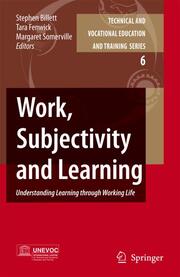Detailansicht
Work, Subjectivity and Learning
Understanding Learning through Working Life, Technical and Vocational Education and Training: Issues, Concerns and Prospects 6
ISBN/EAN: 9781402053597
Umbreit-Nr.: 1127998
Sprache:
Englisch
Umfang: xxii, 276 S.
Format in cm:
Einband:
gebundenes Buch
Erschienen am 31.03.2007
Auflage: 1/2007
- Zusatztext
- InhaltsangabeChapter 1: Work, Subjectivity and Learning, Stephen Billett,- Chapter 2: Escaping/Becoming Subjects: Learning to Work the Boundaries in Boundaryless Work, Tara Fenwick,- Chapter 3: Subjected Bodies, or Embodied Subjects: Subjectivity and Learning Safety at Work, Margaret Somerville,- Chapter 4: Learning and Experience, Henning Salling Olesen,- Chapter 5: Dressing Corporate Subjectivities: Learning What to Wear to the Bank, Kathryn Church et all,- Chapter 6: The Moving Subject: Shifting Work(ers) across and Beyond Organisational Boundaries, Hermine Scheeres and Nicky Solomon,- Chapter 7: Exploring Contruction of Gendered Identities at Work, Lena Abrahamsson,- Chapter 8: Epistemological Beliefs and their Impact on Work, Subjectivity and Learning, Christian Harteis et all,- Chapter 9: Personal Agency and Epistimology at Work, Stephen Billet and Ray Smith,- Chapter 10: Developing Subjective Identities Through Collective Participation, Anneli Etelapelto and Jaana Saarinen,- Chapter 11: Action at a Distance: Governmentality, Subjectivity and Workplace Learning, Richard Edwards and Katherine Nicoll,- Chapter 12: Integrating Life, Work and Identity: Farm Women Transfering 'Self" Though Personal Struggle and Conflict, Jan Allan,- Chapter 13: Work, Subjectivity and Learning in the Diaspora: Immigrant Women of Colour in White Academe, Mary V. Alfred,- Chapter 14: Workers, Subjectivity and Decent Work, Catherine Casey,- Chapter 15: Work, Subjectivity and Learning: Prospects and Issues, Tara Fenwick and Margaret Somerville.
- Kurztext
- In recent year, efforts to understand learning for and throughout working life have moved away from a focus on workplace training to concerns about learning as a component and outcome of engaging in work and work-related activities and interactions. This shift acknowledges a broader set of workplace factors that shape workers' learning and development. Yet equally, it acknowledges that this learning through engagement is also necessarily shaped by the diverse ways that individuals elect to engage or participate in workplace activities. Central here is the issue of individuals' subjectivity and how this is shaped by but shapes engagement in work and, therefore, what learning flows from their participation. It is in considering the relations among subjectivity, learning and work that it is possible to advance both the conceptual and procedural bases for understanding learning through and for working life. Moreover, the focus on relations among subjectivity, work and learning represents a point of convergence for diverse disciplinary traditions and practices that are provided by the book's contributors. In this way, the contributions represent something of the emerging perspectives that are elaborating the complex relations among subjectivity, work and learning, and circumstances in which they are played out.
- Autorenportrait
- InhaltsangabeChapter 1: Work, Subjectivity and Learning, Stephen Billett,- Chapter 2: Escaping/Becoming Subjects: Learning to Work the Boundaries in Boundaryless Work, Tara Fenwick,- Chapter 3: Subjected Bodies, or Embodied Subjects: Subjectivity and Learning Safety at Work, Margaret Somerville,- Chapter 4: Learning and Experience, Henning Salling Olesen,- Chapter 5: Dressing Corporate Subjectivities: Learning What to Wear to the Bank, Kathryn Church et all,- Chapter 6: The Moving Subject: Shifting Work(ers) across and Beyond Organisational Boundaries, Hermine Scheeres and Nicky Solomon,- Chapter 7: Exploring Contruction of Gendered Identities at Work, Lena Abrahamsson,- Chapter 8: Epistemological Beliefs and their Impact on Work, Subjectivity and Learning, Christian Harteis et all,- Chapter 9: Personal Agency and Epistimology at Work, Stephen Billet and Ray Smith,- Chapter 10: Developing Subjective Identities Through Collective Participation, Anneli Etelapelto and Jaana Saarinen,- Chapter 11: Action at a Distance: Governmentality, Subjectivity and Workplace Learning, Richard Edwards and Katherine Nicoll,- Chapter 12: Integrating Life, Work and Identity: Farm Women Transfering 'Self' Though Personal Struggle and Conflict, Jan Allan,- Chapter 13: Work, Subjectivity and Learning in the Diaspora: Immigrant Women of Colour in White Academe, Mary V. Alfred,- Chapter 14: Workers, Subjectivity and Decent Work, Catherine Casey,- Chapter 15: Work, Subjectivity and Learning: Prospects and Issues, Tara Fenwick and Margaret Somerville.
